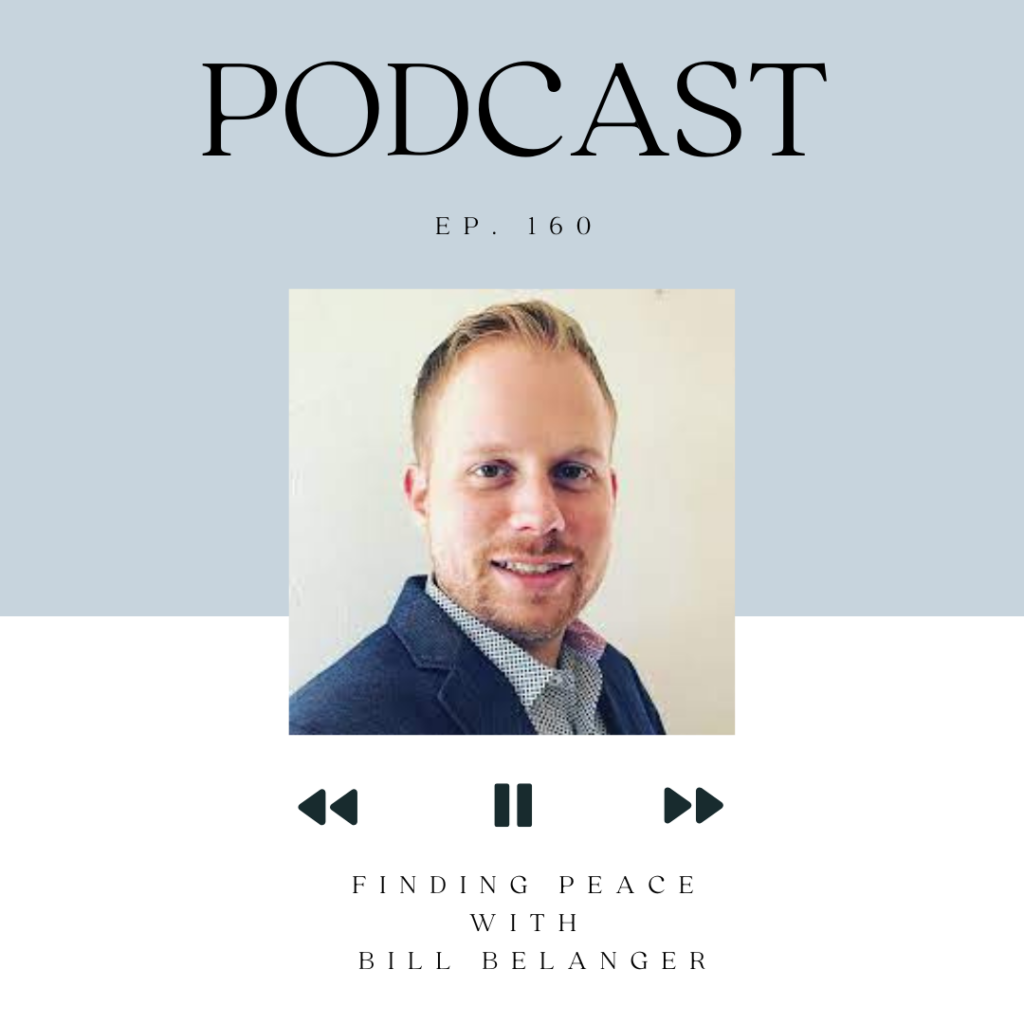So we have spent a lot of time on self-care in recent days and I promise to continue sharing helpful tips and insights, not only my own in my own voice and through my own research, but from powerfully insightful guests I have on the Blossom Your Awesome Podcast each and every week.
We are talking about self-care rituals for finding peace with my guest Bill Belanger.

Table of Contents
3 Self-Care Rituals To Practice Right Now
- Meditation – Meditation is one of the greatest ways to find deeper peace and solace within. A great instructional read for beginning meditation. Or checkout this post – My 3 Meditation Essentials for getting started.
- Journal – A daily journaling can be so illuminating and offer clarity from hardships and struggles in life. It can be an exceptionally powerful way to awaken peace in your life. Check out this post on starting a self-care journal.
- Nature has been proven to have scientific benefits for every part of ourselves – mind, body and soul. Checkout my video on forest bathing here with Nature Connection Coach Hana Lee Goldin.
Presence As Self-Care For Finding Peace
As mentioned I had a remarkable conversation with Bill Belanger on the Blossom Your Awesome Podcast.
Here is some of what he shared below.

To listen to the entire episode tune in here –
Here’s some of that conversation below, but tune above to listen to the entire episode.
Finding Peace With Self-Care Rituals Through Buddhist Philosophy
Sue:
“Talk to us about, for you personally, how and why it was important and how these two merge, this idea of Buddhist philosophy, meditation with the psychotherapy and how that enhances our overall well-being.”
Bill Belanger:
“Yeah, it’s a good question. I think they have fundamentally different approaches to working with human suffering. That teacher, Dan Brown, that I liked, he had a really good description of how to think of how they had come at suffering from different perspectives. So in Freud’s book, Civilization and Its Discontents, he talks about this idea that psychoanalysis, which now we would kind of generally say psychotherapy, can help to reduce people’s neurotic suffering. but it doesn’t really get rid of just this fundamental suffering that we have as humans. So people that are having emotional issues or anxiety or depression, things like that, they can go to psychotherapy and work through some of those things. But there’s still a certain level of suffering that therapy traditionally doesn’t address. And Buddhism kind of picks up where psychotherapy leaves off, where they look at suffering from a slightly different perspective. It’s more of an existential way of looking at it of that we’re born in this body that gets old and gets sick and dies And how do we deal with that and how do we deal with the impermanence of everything? So their perspective goes a little bit deeper than psychotherapy where it’s really ultimately about tapping into an awareness that transcends the self that doesn’t age and that doesn’t get sick and that doesn’t die. So those spiritual traditions are more about connecting with something that’s greater than the self where psychotherapy traditionally is more about healing the self And in my experience, I think that they’re both very useful…..”
Bill goes on to share – “….. So that’s when something I’ve been really interested in too is even if your main goal is just in spiritual awakening or Buddhism or some Of these things therapy can actually help with that And sometimes if you don’t deal with some of these emotional issues that we all have on some level It’s going to be hard to progress on a meditation path.”
Sue:
“Wow, this is so fascinating because most people are doing one or the other, right? And you as a psychotherapist are, you’re coming at it from a clinical standpoint, but you’re bringing this Eastern philosophy, like you’re saying, doesn’t touch on that kind of deeper suffering, right? Where you might be able to heal, to help heal a childhood wound or trauma, but there’s still that suffering that we all are going to go through.”
Bill Belanger:
“Yeah, and in the Buddhist tradition they call that dukkha. So it’s traditionally translated as suffering. So that’s kind of where the Buddhist path starts off is this understanding of dukkha or suffering. There’s other translators that I think have a better translation of dukkha, which means more reactivity, which I think kind of gets to the core of the issue a little bit more. So that basic insight in Buddhism is that we have this reactivity of the mind where we move towards things that we like and we try to cling to them. that we try to push away things that we don’t like, so negative emotions or difficult experiences, or we’re just mindless and we’re not present. So those are called the three poisons.
So with meditation, we can kind of heal those three poisons with the goal being you’re just present with whatever is arising ultimately. Now again, psychotherapy doesn’t have that exact same approach, but I think it can kind of help you get there because ultimately to be present with whatever’s arising, means sometimes you have to be with difficult emotions or trauma if you have that in your past. I think that’s where some people get stuck. But again, I think that they both really do compliment each other nicely.”
Myths Around Meditation
So one of the things I wanted Bill to clarify for us was this myth around meditation and this notion that you are supposed to turn your brain off.
That’s actually not the case and not even possible.
Sue:
“That sounds so amazing and you know this idea can you talk to us because there are so many myths around mindfulness Meditation all of that where it’s like. Oh, I can’t do it. It’s too hard. I can’t turn my mind off But really that’s just a myth right so can you kind of from your perspective give us that insight?”
Bill Belanger:
“Yeah, well, I think first of all, what’s important is the term meditation is a very broad term. So there’s in the Tibetan tradition, there’s probably thousands or tens of thousands of different types of meditations. So some of those systems, they have entire structures where they have preliminary practices, motivational practices, purification practices, visualizations, concentration, mindfulness. So meditation is a very broad term. So I like to think of it in terms of exercise. So we could say that exercise is good, but the difference between swimming and running a marathon and doing yoga and power lifting are pretty significant. So that’s the first thing I would say is that there’s many different types of meditations. And I think that the good thing about that is that depending on a person’s stage of life or what their struggles are, or even their personality structure, different meditations can be used at different times. So for some people, if mindfulness isn’t working, there’s nothing wrong with you, that’s part of the practice is learning that.”But for some people visualization might be better. Or I’m a big fan of some of the more body-based meditations or even yoga. So I think that’s part of it. It’s not just, you know, committing to mindfulness. It’s also just finding the right practice for you at that particular time.
And to say a little bit more about that, the old school way of teaching Tibetan Buddhism was very relational. So it really, I believe in like the fourth or fifth century to the 10th century in Tibet, the heart of Tibetan Buddhism was this relational practice where there was different wandering teachers and they would have very close relationships with their students. So they would really monitor the students’ progress. So they knew, okay, this student really needs to learn concentration right now, or this type of visualization will be really helpful for the student based on what they’re going through. So I think unfortunately some of that has gotten lost in the West now because I’m a big fan of meditation apps and I use them, but you’re not getting that feedback from a teacher that you used to. So I think that’s where psychotherapy does a little bit of a better job with that relational piece because if you’re in therapy with somebody, the therapist really gets to know you, they get to know what you need, so it gets a little bit more personalized. So that’s where I’m hoping meditation starts to go back to is more of that personal. part where you’re kind of taking the best elements of therapy with the best practices from Buddhism.
Closing Thoughts On Self-Care Rituals For Finding Peace
Bill Belanger:
“I think it’s just coming back to this original idea of the Buddha. So if I can give a quick summary of that, I just love the story where he was in this walled palace. So his father was a king and he really wanted his son to become a king. But his father’s plan kind of backfired because he surrounded his son, the Buddha, with all these beautiful women and fruits and music. But eventually he got sick of it and wanted to wander out of the palace. And that’s when he got confronted with life. And he had this epiphany seeing that somebody was, there were sick people, there was old people, and there was people that were dying. So he wanted to kind of transcend that. And then he went on his own journey and met with all these different teachers until he found his own way. So the way that I would kind of leave that as a message, that’s kind of a metaphor for something that we all have to go through. So it’s like, we’re all in this walled palace of our own where we’re protecting ourselves from things that we don’t like. One Tibetan teacher calls it the cocoon of the self where we’re kind of hiding from all these things We want to be only comfortable But eventually that’s the spiritual path It’s it’s meeting reality and really being present with all that discomfort and suffering It’s experimenting and trying different things and different teachers and then ultimately trusting your own intuition and finding your own way So I like that story.”
If You Need A Little More Guidance With Struggles In Life
If you’re interested in learning more about online therapy, I recommend checking out BetterHelp. They offer online therapy sessions with licensed therapists at an affordable price point.
As you know I’m a huge proponent of mental wellness and ensuring we all get the help we need when we need it. And of course, I don’t want you just to get any help I want you to get the right help so I am now sponsored by BetterHelp.
BetterHelp is the world’s largest therapy service, and it’s 100% online.
BetterHelp offers a network of over 25,000 licensed and experienced therapists who can help you with a wide range of issues.
Just click on the link below, answer a few questions and get matched with a therapist from the network.
One of the most amazing features of BetterHelp, if you don’t jive with your therapist you can switch to a new one that’s a better fit for you any time free of charge.
With BetterHelp, you get the same professionalism and quality you expect from in-office therapy, but with a therapist who is custom-picked for you, more scheduling flexibility, and at a more affordable price.

Comments +
Self-Care Rituals For Finding Peace With Bill Belanger
Self Improvement, Self Love